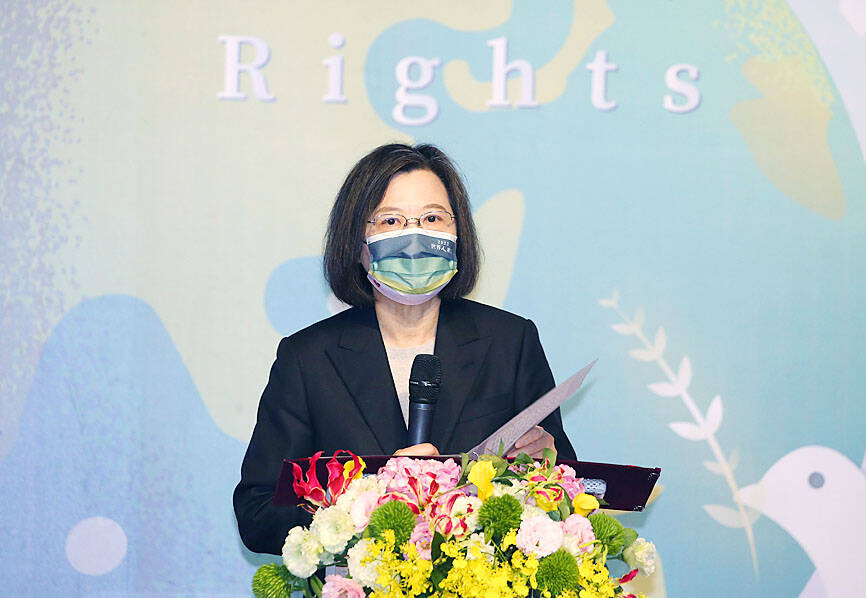The government is continuing its transitional justice efforts and plans to enhance human rights protection in industrial supply chains, President Tsai Ing-wen (蔡英文) said at a Human Rights Day ceremony yesterday.
In a speech at the National Human Rights Museum in Taipei, Tsai said that the government would continue to integrate and supervise its departments in pursuing transitional justice.
The Transitional Justice Commission was dissolved after it submitted its concluding report in May and accomplished its mission, she said, adding that the Cabinet held its first regular meeting for the promotion of transitional justice in September.

Photo: CNA
The government is planning to set up a reinstatement foundation, which would be responsible for returning property confiscated during the White Terror era and compensating victims targeted by the then-Chinese Nationalist Party (KMT) regime, she said.
The Ministry of Health and Welfare would continue to provide services such as trauma therapy to the victims and their families, she said.
The Ministry of Education has drafted guidelines for transitional justice education, and along with the Ministry of Justice, it would promote human rights values in schools, allowing the concepts of transitional justice to take root among younger generations and in social educational institutes, to help Taiwanese learn from the past and avoid the mistakes of the White Terror era, she said.
As Taiwan plays a key role in the global trade, the government would continue efforts to protect human rights in industrial supply chains, Tsai said.
National Human Rights Commission Chairwoman Chen Chu (陳菊) is leading a delegation to France, where she signed a quadrilateral agreement with Paris, Tsai said.
Under the agreement, France is to select human rights experts to be stationed at the commission and assist it in implementing key tasks, such as gender equality and reinforcing democracy, she said.
At the ceremony, Tsai recognized Chang Chang-mei (張常美), a 91-year-old political victim who had been sentenced to 12 years for joining a “seditious” organization during the White Terror era.
The president thanked Chang for sharing her story.
“The democracy and freedom we have today is because past generations sacrificed their lives and freedom to push Taiwan’s democratization process forward,” Tsai said.
“Through continuous efforts to unearth the truth, we are constantly reminded to bravely face our history,” she said.
“The wounds and injustice from the past will not heal on their own over time,” Tsai said. “We pursue transitional justice because we believe that by remembering history and reflecting on it, it can help us avoid mistakes and bring about social solidarity, strengthen democracy and allow Taiwan to continue improving.”

MAKING WAVES: China’s maritime militia could become a nontraditional threat in war, clogging up shipping lanes to prevent US or Japanese intervention, a report said About 1,900 Chinese ships flying flags of convenience and fishing vessels that participated in China’s military exercises around Taiwan last month and in January last year have been listed for monitoring, Coast Guard Administration (CGA) Deputy Director-General Hsieh Ching-chin (謝慶欽) said yesterday. Following amendments to the Commercial Port Act (商港法) and the Law of Ships (船舶法) last month, the CGA can designate possible berthing areas or deny ports of call for vessels suspected of loitering around areas where undersea cables can be accessed, Oceans Affairs Council Minister Kuan Bi-ling (管碧玲) said. The list of suspected ships, originally 300, had risen to about

DAREDEVIL: Honnold said it had always been a dream of his to climb Taipei 101, while a Netflix producer said the skyscraper was ‘a real icon of this country’ US climber Alex Honnold yesterday took on Taiwan’s tallest building, becoming the first person to scale Taipei 101 without a rope, harness or safety net. Hundreds of spectators gathered at the base of the 101-story skyscraper to watch Honnold, 40, embark on his daredevil feat, which was also broadcast live on Netflix. Dressed in a red T-shirt and yellow custom-made climbing shoes, Honnold swiftly moved up the southeast face of the glass and steel building. At one point, he stepped onto a platform midway up to wave down at fans and onlookers who were taking photos. People watching from inside

Japan’s strategic alliance with the US would collapse if Tokyo were to turn away from a conflict in Taiwan, Japanese Prime Minister Sanae Takaichi said yesterday, but distanced herself from previous comments that suggested a possible military response in such an event. Takaichi expressed her latest views on a nationally broadcast TV program late on Monday, where an opposition party leader criticized her for igniting tensions with China with the earlier remarks. Ties between Japan and China have sunk to the worst level in years after Takaichi said in November that a hypothetical Chinese attack on Taiwan could bring about a Japanese

The WHO ignored early COVID-19 warnings from Taiwan, US Deputy Secretary of Health and Human Services Jim O’Neill said on Friday, as part of justification for Washington withdrawing from the global health body. US Secretary of State Marco Rubio on Thursday said that the US was pulling out of the UN agency, as it failed to fulfill its responsibilities during the COVID-19 pandemic. The WHO “ignored early COVID warnings from Taiwan in 2019 by pretending Taiwan did not exist, O’Neill wrote on X on Friday, Taiwan time. “It ignored rigorous science and promoted lockdowns.” The US will “continue international coordination on infectious